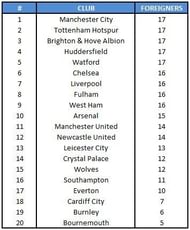What's the story?
Premier League clubs could be forced to reduce the number of foreign players in their squads as the PL deliberates with the Football Association (FA) about post-Brexit plans.
According to a report in The Times, the proposal would see the number of overseas players in the 25-man squad reduced to 12.
In case you didn't know...
Under the existing rules, each club can have a maximum of 17 overseas players registered in their squads.
Among the 2018/19 Premier League squads, five clubs currently have the maximum quota of 17 players, including two 'Big Six' clubs - defending champions Manchester City and Tottenham Hotspur.
Heart of the matter
The FA sees Brexit (Britain's exit from the European Union) as the ideal opportunity to increase the number of English players in the country's top flight.
With the Premier League going global in recent years, the number of foreigners has only increased, as has the worldwide audience, as the best talents in the world look to ply their trade on English shores.
The English Football League (EFL) already has a rule where at least seven players among the 18 players in the matchday squad must be homegrown. An overseas player can be considered a homegrown player if he spent three years in a club's academy between the age of 16 and 21.
After Brexit, it would be impossible for club's academies to sign foreign teenagers until they turn 18. Therefore, they can still be considered homegrown at the age of 21 but they cannot be included in the squad until then.

As things stand, only seven Premier League clubs would meet the requirements with clubs such as Bournemouth, Burnley, and Cardiff City employing fewer than 10 foreign players.
What's next?
This move would make it tougher for clubs to sign foreign youngsters while simultaneously increasing the transfer market value of English youngsters. It could become a case where signing EU players will be considered the same as signing non-EU players.
Non-EU players (like South American and African players) have to be regular internationals and from a team that has a favourable FIFA ranking to get an opportunity to play in England - unless they get a special work permit.
